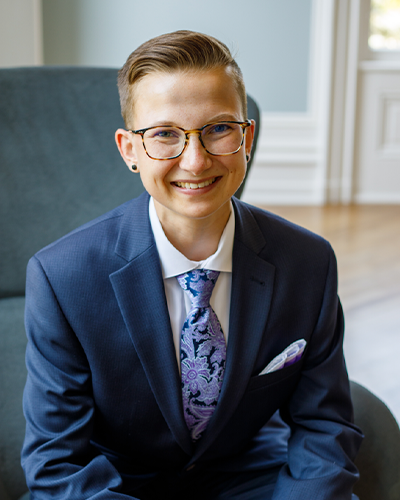Leighton Schreyer, BSc'22

Global Winner, Medical Sciences category
What initially began as a summer student project between his third and fourth year as an undergraduate student, ultimately became a globally recognized research project for Leighton Schreyer – and confirmed his passion for medicine.
The paper, entitled "The Discovery of an Epigenetic Signature for Duchenne Muscular Dystrophy Using Genome-Wide DNA Methylation Analysis", was recently named the Gold Medal Winner in the Medical Sciences category of The Global Undergraduate Awards, a pan-disciplinary competition that recognizes excellence in undergraduate coursework.
“At the time, I was increasingly interested in pursuing a career as a clinician scientist and was hoping to find a summer research position that would give me the opportunity to gain a deeper understanding of both aspects—research and clinical—of that kind of a career. I was able to connect with Dr. Craig Campbell, a pediatric neurologist at London Health Sciences Centre, who ended up supervising my research and also let me shadow him in clinic, which was an invaluable learning experience,” said Schreyer, who completed his Honours Specialization in Neuroscience at Western and is now in medical school at the University of Toronto.
Schreyer’s research focused on understanding the role of epigenetics in the pathophysiology Duchenne Muscular Dystrophy (DMD). Specifically, Schreyer analyzed the DNA methylation patterns of DMD patients in hopes of identifying an epigenetic signature (called an episignature) that could be targeted for diagnostic and therapeutic purposes.
Leighton says he submitted his research to the Undergraduate Awards hoping to share his research more broadly, and to engage with an international cohort of diverse, passionate, and like-minded students.
“Programs like the Undergraduate Awards and its Global Summit provide incredible opportunities to connect with other students and broaden your perspective by listening to and learning from students who have different experiences and interests. These kind of events always leave me feeling inspired and hopeful about what lies ahead and what progress we can make — whether that’s related to science, technology, the environment, or social justice and human rights. When you foster interdisciplinary and international dialogue, you create opportunities for action, create networks of changemakers, and foster collaboration.”
In the future, Schreyer is interested in engaging more in research that explores social determinants of health and addresses issues of health equity and health justice. He hopes to become more engaged in public health and to use his platform as a physician to spearhead positive transformational change.
“I want to serve the public and hope that I will be able to reduce the barriers our most vulnerable communities face to accessing safe, equitable, inclusive, and culturally competent care,” he said. I’ve always loved working with children and youth, so I’m hoping to keep that as part of what I’m focused on.
“I’m not entirely sure what my specialization will be or where I’ll end up, but that’s part of the beauty of starting a new chapter – all the doors are open. I’m hoping to use these next few years to explore my options and see where life takes me.”






